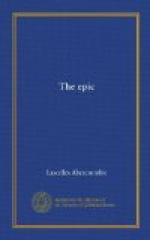The real truth seems to be, that there is an inevitable and profound difficulty in carrying on the Miltonic significance in anything like a story. Regular epic having reached its climax in Paradise Lost, the epic purpose must find some other way of going on. Hugo saw this, when he strung his huge epic sequence together not on a connected story but on a single idea: “la figure, c’est l’homme.” If we are to have, as we must have, direct symbolism of the way man is conscious of his being nowadays, which means direct symbolism both of man’s spirit and of the (philosophical) opponent of this, the universal fate of things—if we are to have all this, it is hard to see how any story can be adequate to such symbolic requirements, unless it is a story which moves in some large region of imagined supernaturalism. And it seems questionable whether we have enough formal “belief” nowadays to allow of such a story appearing as solid and as vividly credible as epic poetry needs. It is a decided disadvantage, from the purely epic point of view, that those admirable “Intelligences” in Hardy’s The Dynasts are so obviously abstract ideas disguised. The supernaturalism of epic, however incredible it may be in the poem, must be worked up out of the material of some generally accepted belief. I think it would be agreed, that what was possible for Milton would scarcely be possible to-day; and even more impossible would be the naivete of Homer and the quite different but equally impracticable naivete of Tasso and Camoens. The conclusion seems to be, that the epic purpose will have to abandon the necessity of telling a story.
Hugo’s way may prove to be the right one. But there may be another; and what has happened in the past may suggest what may happen in the future. Epic poetry in the regular epic form has before now seemed unlikely. It seemed unlikely after the Alexandrians had made such poor attempts at standing upright under the immensity of Homer; it seemed so, until, after several efforts, Latin poetry became triumphantly epic in Virgil. And again, when the mystical prestige of Virgil was domineering everything, regular epic seemed unlikely; until, after the doubtful attempts of Boiardo and Ariosto, Tasso arrived.




